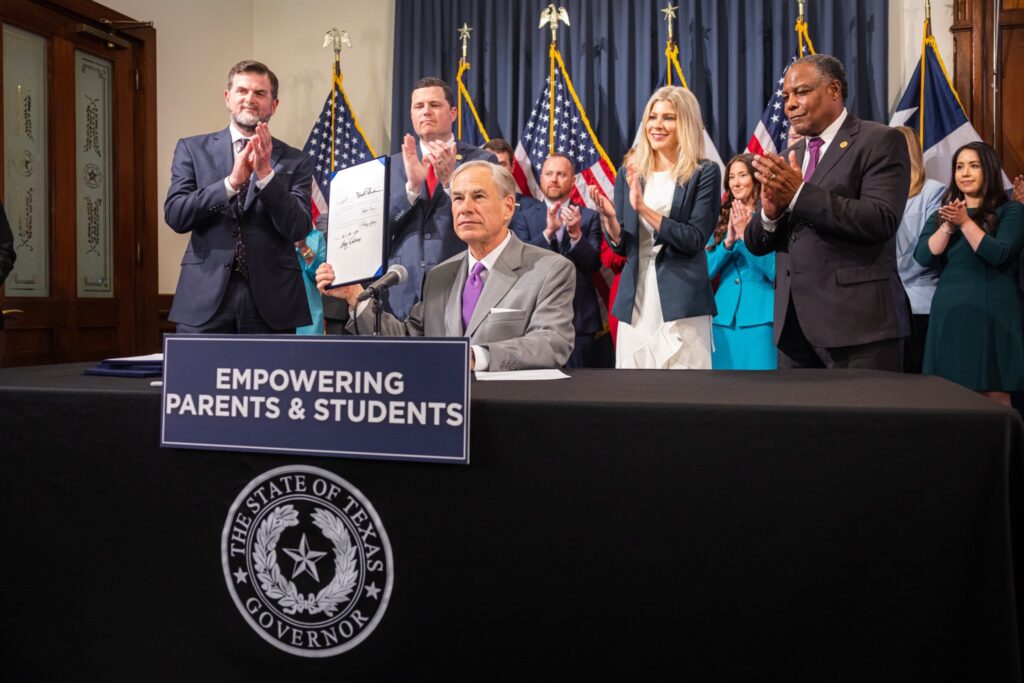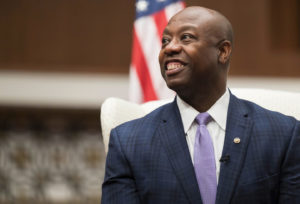Gov. Abbott signs parental rights, education bills into law
(The Center Square) – Texas Gov. Greg Abbott signed four parental rights and education bills into law on Monday and separately expanded virtual learning programs statewide. He did so less than two…

(The Center Square) – Texas Gov. Greg Abbott signed four parental rights and education bills into law on Monday and separately expanded virtual learning programs statewide. He did so less than two weeks after signing a digital privacy bill into law expanding online protections for minors.
“The House and Senate did a great job to provide transformative changes for education in the state of Texas,” he said during a bill signing at the Capitol of bills that received bipartisan support.
The new laws expand parental access to their children’s curriculum, give parents greater say over whether their child should repeat a grade, provide greater transparency over school materials and remove inappropriate books from school libraries. They also expand resources to more special needs students. The governor was joined by Sen. Brandon Creighton, Reps. Charles Cunningham, Lacey Hull, and Jared Patterson, Texas Public Policy Foundation CEO Greg Sindelar, parents and empowerment advocates.
Abbott first signed HB 900 into law, which prohibits public school systems from possessing, acquiring and purchasing “harmful library material that is sexually explicit, pervasively vulgar, or educationally unsuitable.”
“Parents deserve to know what books are in school libraries,” Abbott said, adding that he signed the bill to get “inappropriate or vulgar materials out of our schools.”
He also signed HB 1605 into law, which expands parental access and review of instructional materials and requires school districts to provide teachers with a full sequence of instructional materials so they don’t have to devote personal or planning time to develop them. The new law “transforms school curriculum, improving it for Texas parents, students, and teachers,” he said.
He also signed HB 1926 into law, which removes a $30 million cap on the total amount of funds appropriated to the Supplemental Special Education Services program every fiscal year, expanding access to more special needs students.
“We will empower parents of students with special needs with the tools and resources they need to provide their child with the best education,” Abbott said, following through with one part of his parental rights legislative priority he outlined before the regular legislative session. The signature feature of the legislative priority will be addressed in a special legislative session to be called later this year, the governor has said. It creates a Teacher Bill of Rights, a Parental Bill of Rights, and creates a school choice program including Education Savings Accounts.
The SSES program was created in October 2020 to help parents with special needs students receive assistance they would have normally received through in-person instruction but couldn’t during COVID-era school closures. Thousands of families have been on a wait list since the program began. By expanding it and removing the cap, more parents will have access to what many have described is an invaluable program.
Abbott also signed HB 3803 into law to give greater choice to parents when deciding if their child should repeat a grade level for 4th through 8th grades or a high school level course. He said he signed the bill so “parents – not school administrators – have the option to determine whether it’s in the child’s best interest to repeat a grade level.”
He signed these bills into law less than two weeks after signing HB 18 into law to expand data privacy protections and online safeguards for minors. Sindelar said this new law is “a crucial step in the right direction to protect our most precious population from the overwhelming harms and stop the commodification of children by Big Tech.”
“As children are experiencing unprecedented levels of anxiety, depression, self-harm, sex trafficking, and suicide online,” he said the new law “is a momentous victory in the bid to put the safety and well-being of children over the pecuniary interests of Big Tech.”
Abbott also directed Texas Education Agency Commissioner Mike Morath on Monday to waive specific requirements for school districts or open-enrollment charter schools so they can continue offering virtual instruction options for students in 3rd through 12th grade through the Texas Virtual School Network. His directive expands the initiative for another two years “until a more permanent solution is adopted during the next regular legislative session in 2025.”
“Texas wants to see all of our children succeed and receive the best education possible,” Abbott said in a statement separate from the bill signing. “Many parents across our state have found that the best fit for their child’s education is through virtual instruction.”
Texas schools currently offer virtual instruction through a patchwork of several state statutes including one that authorizes schools to receive full-time funding for students enrolled in local, virtual learning programs through TXVSN.
TEA’s waiver authority allows school systems to offer full-time virtual instruction and receive full funding for every enrolled student in 3rd through 12th grade who successfully complete the school year.
TEA is expected to communicate this week to school districts currently offering virtual instruction through other statutes to provide guidance so they can continue offering such instruction.



